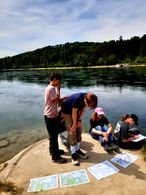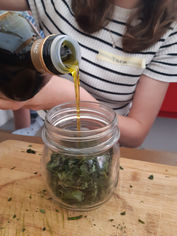Education for sustainable development – a camp for experiencing nature and taking responsibility
Education for Sustainable Development (ESD) means actively shaping the future, recognising interdependencies and taking responsibility. Our ESD camps offer young people an intensive week combining practical nature conservation with participatory learning – setting them apart from traditional environmental education weeks.

Target group
The ESD camps are primarily aimed at young people aged 15 to 18 at grammar schools and vocational schools. They already have the necessary prior knowledge and maturity to understand complex topics and actively participate in shaping them.
Upon request, 9th-grade students from secondary schools can also participate, provided the group has sufficient independence. The camps are particularly suitable for schools that want to enrich their curriculum with a hands-on project week on nature and sustainability.
Special features of the ESD camps
In contrast to traditional camps, the students actively participate in shaping the week themselves:
-
Even before the camp, they work in groups on topics such as catering, research, public relations, financing, and leisure activities.
-
Each student completes approximately 12 hours of preparatory work in class or during their free time.
-
The teacher accompanies the process – supported by materials, learning journals and coaching from Naturnetz.
This creates a camp with real practical relevance and a lasting learning effect.
Organisation & Services
-
Technical support from experienced project managers and educators
-
Coaching and materials for teachers and pupils
-
Provision of tools, materials and all necessary permits
-
Cooperation with local authorities, foresters and nature conservation officers


learning objectives
The youngsters…
-
They experience ecological relationships through practical action.
-
to learn to take responsibility and to work in a participatory manner
-
acquire skills in teamwork, communication and project management
-
strengthen team spirit and initiative
-
gain a deeper understanding of sustainability and biodiversity
Sequence
Preparation (approx. 1 month)
-
Introduction to the topic of biodiversity (e.g. mystery in class)
-
Formation of working groups & start of project work
Project phase (1.5–2 months)
-
Independent work of students in their groups
-
Coaching by teachers and specialists from Naturnetz
Camp week
-
Practical work in nature conservation: hedge maintenance, dry meadow maintenance, building small structures, combating neophytes
-
Implementation of the prepared program components (e.g. catering, evening activities, public relations)
Follow-up
-
Reflection in class, optionally supported by materials from Naturnetz
Locations
The ESD camps are currently taking place at four ecologically valuable locations with group accommodations.
Blenio Ticino
Pfäffigersee Zurich
Dötra Ticino
Thurauen Zurich
You can book ESD camps through our camp week page. Please simply mention "ESD camp" in the "Which activities are you interested in?" booking section. If you have any questions, please feel free to contact us directly using the general contact form .











